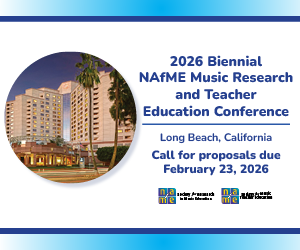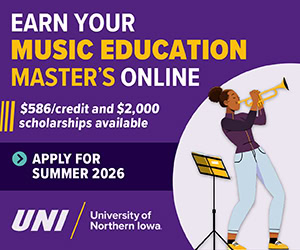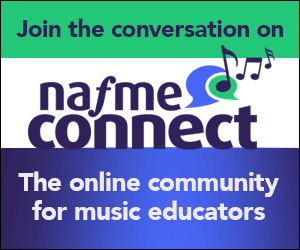/ News Posts / Guitar Class in The Sunshine State
Guitar Class in 50 States
Number 6: The Sunshine State
By Thomas Amoriello Jr.
NAfME Council for Guitar Education Chair
NAfME Council for Guitar Education Southern Division Representative Christopher Perez is a leader in the field and one of the reasons why Florida remains strong in the guitar education movement (more students were chosen for NAfME All-National Guitar Ensemble than any other state). He is very active as a teacher, presenter, adjudicator, clinician, composer/arranger and musician. Currently Mr. Perez is the Director of Guitar Studies at Freedom High School in Orlando and was selected as a quarterfinalist for the 2017 GRAMMY Foundation Music Educator Award.
Chris has presented sessions at NAfME, FMEA, and OCPS Music Conferences, and his guitar ensembles continually perform on local, state, national, and international stages. Under his direction, the FHS Guitar Ensembles performed several times as a demonstration music ensemble and in concert at FMEA All-State Music Conference in Tampa, Florida, at the Stetson University Guitar Day in DeLand, Florida, and in concert at the 2013 and 2017 Long Island Guitar Festival in New York. Mr. Perez continually serves on several local and state music assessment writing teams. In addition to being a guitarist, he is also a percussionist with the Southern Winds Symphonic Band and with Walt Disney World’s “ENCORE! Cast Performing Arts.” Chris is a graduate of Western Illinois University.
Please tell us about your school and overall music program.
Freedom High School (FHS) in Orlando, Florida, is a traditional 9th-12th grade high school with Orange County Public Schools. For the 2018-2019 school year we will have an enrollment of more than 4,000 students. Our Performing Arts Department has 12 full-time teachers. Performing Arts classes offered for our students include Band, Chorus, Dance, Drama/Theater, Guitar, Orchestra, Piano, and Stagecraft. Within all Performing Arts classes, students of all ability levels (novice to advanced) are able to participate. The annual percentage of the student body enrolled in the Performing Arts at FHS has been constant at about 40%. As a department we make every effort to have an offering that can reach out to any student.
“As a department we make every effort to have an offering that can reach out to any student.”
Please tell us about your own personal musical background growing up and your collegiate experience.
I began my formal music studies in 5th grade playing Alto Saxophone. As I moved to middle school and high school I eventually moved to playing Tenor Sax, Baritone Sax, Piano, and Drums. In college (Oakton Community College and Western Illinois University) I studied both Saxophone and Percussion and was heavily interested in synthesizers and electronic music. In addition to being a Music Major, I was a Drum Major for two seasons with the WIU Marching Leathernecks, and also was involved in several rock bands.
How do the guitar family of instruments fit into your teaching?
The FHS Guitar Program will use different guitars based on what unit I’m teaching or what is programmed for a concert. We play “Bach to Rock,” and instrument-wise will use Requintos, Classical, Acoustic, Electric, Acoustic Bass, and Electric Bass guitars.
What obstacles did you face when you were first hired at your school?
In 2005 I was an Associate Band Director. Due to different directions of where the Band program was going, I started teaching guitar in 2007. We offered only three classes at the time. The first 18 months were very tough. I did not know how to play, did not know guitar curriculum, did not know how to teach guitar. By the 2009-2010 school year that I began to have enough experience, resources, and direction that we started becoming a Guitar program.
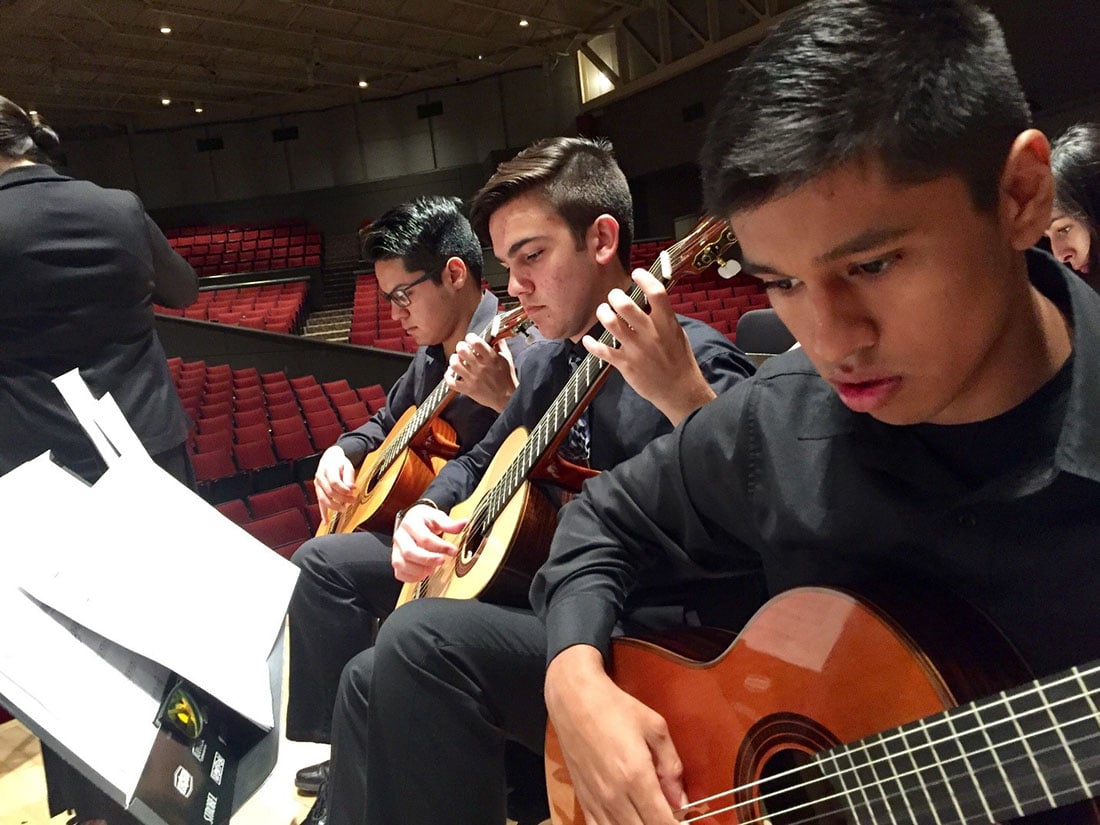
Courtesy of Christopher Perez
What kind of guitar classes do you teach?
At Freedom High School we offer seven classes. These include three Guitar 1 (beginning) classes, three ability-based guitar ensembles (Ponticello, Tasto & Guitar Orchestra), and a private study class (Guitar Conservatory) to prepare students who will major in Guitar Performance or Guitar Education in college. Each year we have about 200 students enrolled in the FHS Guitar Program.
What would you to say to the non-guitarist music educator who is about to include or interested in incorporating the guitar into their program?
Congratulations! Teaching guitar can be a very worthwhile endeavor. Find a good method book on which to base your curriculum. Once I found a method I was comfortable to use, it made teaching easier.
Another [tip] is to make every effort to find colleagues (middle school, high school, or college levels) who are great guitar teachers and collaborate with them. Working with others and asking questions will help you be more solid in delivering quality guitar instruction and music teaching to your students.
Lastly, if you intend to develop your guitar classes into a full multi-level guitar program, be sure you work closely with your school administration, so you can have students in appropriate level classes and ensembles. Have an audition system in process to place your more advanced students. Give student opportunities to perform, either through in-class recitals or in full concerts.
“Working with others and asking questions will help you be more solid in delivering quality guitar instruction and music teaching to your students.”
Do you have any success stories you would like to share about students (musical and non-musical)?
If my students graduate and have developed a deep appreciation for the arts, support the arts, and become good citizens and lifelong learners, then I consider my being their teacher a success. Professionally, they have become everything in-between; a tattoo artist, teachers, doctors, engineers, military service, and much more. I keep in touch with them after they graduate high school. All of them are doing well and leading successful lives, I’m happy to say.
“If my students graduate and have developed a deep appreciation for the arts, support the arts, and become good citizens and lifelong learners, then I consider my being their teacher a success.”
Program-wise, we constantly work and perform with international artists and teachers including William Kanengiser, Dr. Stephen Robinson, Dr. Ulisses Rocha, and Dr. Eva Beneke, to name a few. My students and ensembles have performed several times in concert and as a demonstration ensemble for our Florida Music Education Association (FMEA) All-State Music Conference, and also at the Long Island Guitar Festival in New York. This school year my top ensemble, the Guitar Orchestra, is performing in concert at the Florida Guitar Festival at Florida State University (Tallahassee), and my three ensembles will perform and participate in the Stetson University Guitar Day next spring. I have two students who were accepted into the NAfME All-National Guitar Ensemble.
What do you tell your talented students who are planning to pursue music or guitar studies in college after they finish with you?
The most important thing I tell them is to look at and visit as many schools as you can. Have a lesson with a guitar professor at the school(s) in which you are interested. Every school and guitar professor is different. You need to feel comfortable with the teacher with whom you will work and the school environment in which you will live. Being in a positive and supportive place will permit you to have a more productive collegiate career. College is very expensive now, and students need to make sure they (and their families) are making a wise investment.
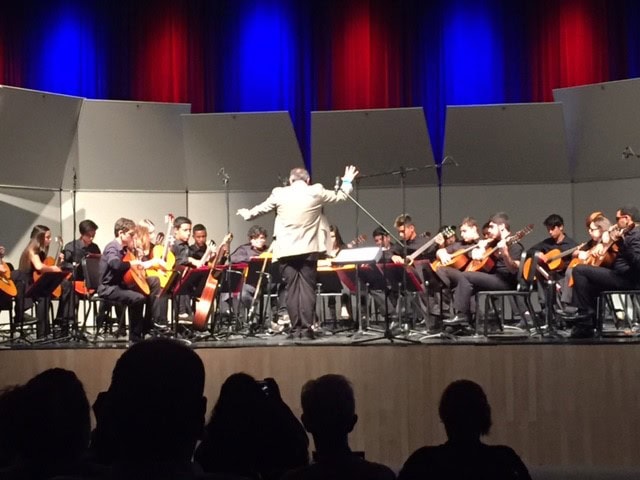
Courtesy of Christopher Perez
Do you have any networking or advocacy tools that have worked for you to promote your program that would help other educators?
For FHS we have our website. Through Facebook there is a community group “School Guitar Teachers” where guitar teachers can ask questions and seek advice from others. It’s a very active community, and I’ve seen a lot of music educators doing worthwhile collaboration, helping and supporting each other. Another place is through the National Association for Music Education. There numerous articles, webinars, and blogs on guitar education available through the NAfME site.
What kind of future do you see for guitar in music education in Florida school systems?
Guitar Education is very strong in Florida. Thanks to the vision and hard work of Ed Prasse (Leon High School, Tallahassee, FL), we have a FMEA State-Sponsored Guitar Festival, FMEA All-State High School Guitar Ensemble, and the possibility of adding an All-State Middle School Guitar Ensemble in the future. On the collegiate level, FSU hosts the Florida Guitar Festival; Stetson University hosts the Stetson Guitar Festival; and Miami University hosts the Miami International GuitART Festival. More Florida school districts are hosting their own All-County Guitar Festivals, and I’m seeing more schools and their guitar students participating in Solo & Ensemble Music Performance Assessments. It’s wonderful to see more districts and schools in Florida becoming actively involved in offering guitar to their students.
What type of arrangements and/or transcribing have you done for your school performances?
Due to my active teaching schedule and administering the FHS Guitar Program, I do not have much time to arrange or transcribe music for my students or ensembles. I’ve only done about four or five over the years. In our guitar music library I have music from the Forrest Guitar Ensemble website, Eythor Thorlaksson/Sveinn Eythorsson website, and from different publishing houses including ClearNote, d’ OZ/Doberman Publications, Class Guitar Resources, Royal Conservatory, Alfred, FJH Publications, Mel Bay, Amsco, and Willis Music Company.
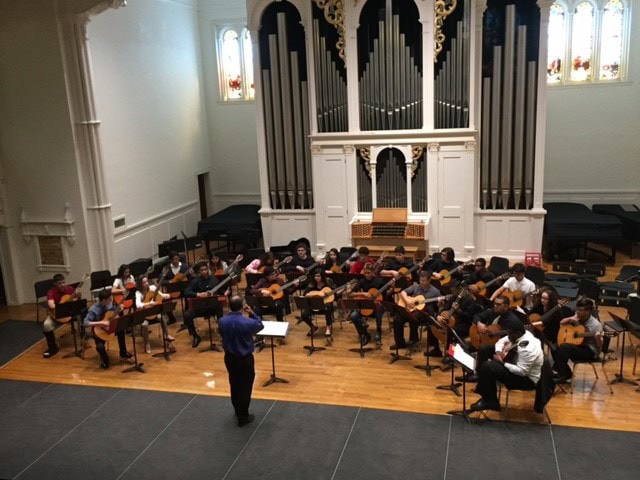
Courtesy of Christopher Perez
Do you do any musical performance or activities outside of your public school teaching duties?
I’m a percussionist with both the Southern Winds Symphonic Band (through Stetson University, DeLand, FL) and with Walt Disney World’s “Encore! Cast Performing Arts.” I also play drums, saxophone, and guitar for services and masses at my church.
It’s very possible through focused and hard work to develop your own amazing guitar program.
Any last thoughts to conclude our interview?
If done correctly, teaching guitar can be very rewarding and fun for both students and teachers. A guitar student is a different person than one who would join band, choir, dance, drama, piano, or orchestra. It’s very possible through focused and hard work to develop your own amazing guitar program. There are more great resources and teachers here to help you grow your teaching skills.
About the author:
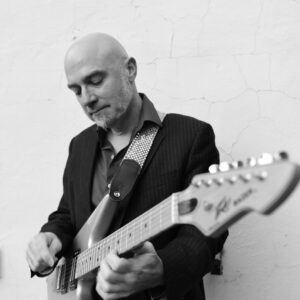 Thomas Amoriello is the NAfME Council for Guitar Education Chair and also serves as the Guitar Education Chairperson for the New Jersey Music Education Association. He teaches guitar for the Flemington Raritan School District and Hunterdon Academy of the Arts. Tom graduated from Shenandoah Conservatory with a Master of Music Degree in Classical Guitar Performance. He is the author of the children’s picture books: A Journey to Guitarland with Maestro Armadillo and Ukulele Sam Strums in the Sand (March 2019), both available from Black Rose Writing. He recently made two vinyl record releases on the H42 Records label of Hamburg, Germany, featuring former members of Black Sabbath, Whitesnake, Dio, Ozzy Osbourne, Yngwie J. Malmsteen’s Rising Force and more.
Thomas Amoriello is the NAfME Council for Guitar Education Chair and also serves as the Guitar Education Chairperson for the New Jersey Music Education Association. He teaches guitar for the Flemington Raritan School District and Hunterdon Academy of the Arts. Tom graduated from Shenandoah Conservatory with a Master of Music Degree in Classical Guitar Performance. He is the author of the children’s picture books: A Journey to Guitarland with Maestro Armadillo and Ukulele Sam Strums in the Sand (March 2019), both available from Black Rose Writing. He recently made two vinyl record releases on the H42 Records label of Hamburg, Germany, featuring former members of Black Sabbath, Whitesnake, Dio, Ozzy Osbourne, Yngwie J. Malmsteen’s Rising Force and more.
Published Date
September 12, 2018
Category
- Ensembles
Copyright
September 12, 2018. © National Association for Music Education (NAfME.org)

